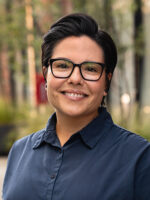Funding: P50AA005595-43S1
Project PI: William C. Kerr
Principal Investigator: William C. Kerr, PhD
Sexual and gender minority (SGM; e.g., lesbian, gay, bisexual, transgender, nonbinary) adults often have higher risk of hazardous drinking and drug use than their heterosexual and cisgender peers. This research explores which individual (e.g., depression, using alcohol/drugs to cope), interpersonal (e.g., experiences of discrimination or victimization), and community (e.g., living in more stressful neighborhood circumstances) factors contribute to hazardous drinking and drug use among SGM individuals, and how these influences might differ between SGM subgroups. Findings will be useful to develop and refine both inclusive and SGM-specific prevention and intervention strategies designed to reduce risks for hazardous drinking, drug use, and related problems among SGM adults.
Sexual and gender minorities (SGM) experience notably greater hazardous alcohol and drug (AOD) use compared to cisgender heterosexuals. Efforts to study these disparities and advance SGM health equity have expanded and matured over the last few decades. However, studies are often limited in their ability to make meaningful comparisons between SGM and cisgender heterosexuals, and to delve into subgroup differences within SGM, due to the challenge of recruiting large enough SGM and comparison samples.
This administrative supplement to the Epidemiology on Alcohol Problems: Alcohol-Related Disparities (P50AA005595-41) Research Project to field the National Alcohol Survey will collect an oversample of 1,200 SGM participants in parallel with the 2023-2024 National Alcohol Survey (NAS). This will enable our substantive goals to identify unique and modifiable risk and protective factors that will inform interventions to reduce disparities in risk for hazardous AOD use and related problems in SGM communities.
Although research over the last 20 years has identified several important risk factors for hazardous AOD use among SGM, the methodological limitation of small SGM samples or no cisgender heterosexual comparison limited understanding of how these risk factors contribute to the disparities between SGM and cisgender heterosexuals, or whether they similarly impact both populations.
Aim 1: we will apply a comprehensive disparities framework to examine several important predictors of hazardous AOD use comparing SGM and cisgender heterosexual populations, which will identify predictors for inclusion in interventions to reduce SGM alcohol and drug-related disparities. Additionally, since less is known about protective factors for hazardous AOD use among SGM, we will also examine reasons for not drinking and make comparisons between the SGM and cisgender heterosexual samples.
Aim 2: Consistent with the conceptual framework applied by the NAS, we will take a socioecological perspective to identify the risk and protective factors that have the most impact on hazardous AOD use among SGM populations using dominance analysis. Specifically, in addition to individual- level factors associated with hazardous AOD use, we will capitalize on the rich interpersonal, community, and geo-coded data that the NAS collects, and expand it by adding SGM-specific questions about SGM identity disclosure, perceived AOD use norms among SGM peers, and perceived neighborhood SGM social climate. Additionally, we will include measures of SGM-based victimization (bias-related verbal abuse, physical and sexual assault), which will allow for investigations of the distribution and impact of this type of victimization on hazardous AOD use.
The study will capitalize on expertise of a nationally recognized team of researchers in SGM AOD research and employ rigorous statistical approaches not yet applied to understanding AOD outcomes among SGM populations to address actionable gaps in knowledge and advance SGM health research. Results will help inform interventions designed to reduce disparities in AOD-related problems among SGM populations.








